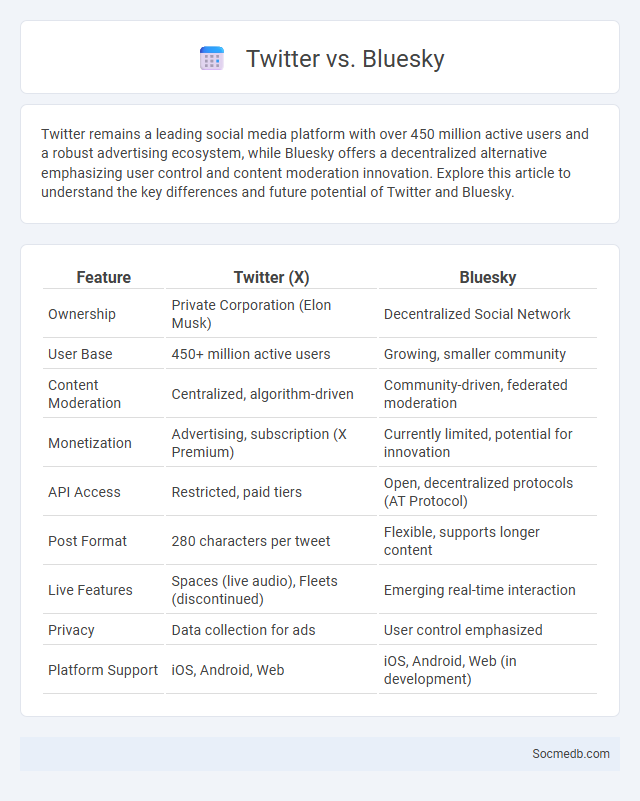
Photo illustration: Twitter vs Bluesky
Twitter remains a leading social media platform with over 450 million active users and a robust advertising ecosystem, while Bluesky offers a decentralized alternative emphasizing user control and content moderation innovation. Explore this article to understand the key differences and future potential of Twitter and Bluesky.
Table of Comparison
| Feature | Twitter (X) | Bluesky |
|---|---|---|
| Ownership | Private Corporation (Elon Musk) | Decentralized Social Network |
| User Base | 450+ million active users | Growing, smaller community |
| Content Moderation | Centralized, algorithm-driven | Community-driven, federated moderation |
| Monetization | Advertising, subscription (X Premium) | Currently limited, potential for innovation |
| API Access | Restricted, paid tiers | Open, decentralized protocols (AT Protocol) |
| Post Format | 280 characters per tweet | Flexible, supports longer content |
| Live Features | Spaces (live audio), Fleets (discontinued) | Emerging real-time interaction |
| Privacy | Data collection for ads | User control emphasized |
| Platform Support | iOS, Android, Web | iOS, Android, Web (in development) |
Introduction to Twitter, Bluesky, and Trending Topics
Twitter, a leading social media platform, enables users to share real-time updates through concise tweets, fostering global conversations. Bluesky, an emerging decentralized social network initiated by Twitter's founder, aims to create an open and user-controlled ecosystem. Trending topics on these platforms highlight the most popular subjects, driven by user engagement and algorithmic analysis, reflecting current public interests and breaking news.
Platform Overviews: Twitter vs Bluesky
Twitter, a well-established social media platform, offers real-time news updates, hashtag-driven trends, and a diverse user base exceeding 400 million active users. Bluesky, developed with a decentralized approach, emphasizes user control over data, privacy, and algorithmic transparency, targeting niche communities seeking alternatives to traditional networks. Both platforms support multimedia sharing and foster public discourse but differ significantly in governance models and user experience customization.
Key Features Comparison
Social media platforms offer diverse key features, including real-time messaging, multimedia sharing, and advanced analytics tools to track user engagement. Instagram emphasizes visual content with Stories and Reels, while Twitter focuses on concise text updates and trending topics through hashtags. Facebook integrates community groups, marketplace capabilities, and in-depth ad targeting, catering to a broad demographic spectrum.
User Base and Community Dynamics
Social media platforms host billions of active users, creating vast and diverse user bases that drive content creation and interaction. Your engagement shapes community dynamics by influencing trends, fostering connections, and amplifying information flow within networks. Understanding user behavior and platform algorithms enhances your ability to navigate and contribute effectively to these digital ecosystems.
How Trending Topics Work on Each Platform
Trending topics on social media platforms are driven by algorithms that analyze user interactions such as shares, likes, comments, and hashtag usage within a specific time frame. Twitter identifies trending topics by monitoring the rapid increase in tweets containing specific keywords, emphasizing regional relevance and breaking news. Facebook and Instagram use a combination of engagement rates and content recency to surface popular hashtags and posts, tailoring trends to user interests and social circles.
Algorithm Differences: Discovering Trends
Social media platforms utilize unique algorithms tailored to their user base and content format, significantly influencing the visibility of posts and trends. You can leverage insights from these algorithm differences to identify emerging trends more effectively on platforms like Instagram, TikTok, and Twitter. Understanding factors such as engagement metrics, content relevance, and timing can enhance your strategy to stay ahead in trend discovery.
Moderation and Content Control
Effective social media moderation leverages AI-powered filters and human oversight to identify and remove harmful or inappropriate content, ensuring a safe online environment. Robust content control mechanisms enable platforms to enforce community guidelines, reducing misinformation and protecting user privacy. You can enhance your social media experience by actively engaging with platforms that prioritize transparent and consistent moderation policies.
Influencer and Brand Engagement
Influencers drive brand engagement by leveraging authentic content and established trust with their audience, resulting in higher conversion rates and enhanced brand visibility. Platforms like Instagram and TikTok enable influencers to create targeted campaigns that boost customer interaction and foster community growth. Data shows that influencer marketing generates 11 times higher ROI compared to traditional digital marketing efforts.
Privacy and Data Policies
Social media platforms implement comprehensive privacy and data policies to protect user information and regulate data sharing practices. These policies outline how personal data is collected, stored, used, and shared, ensuring compliance with regulations like GDPR and CCPA. Users must review these policies regularly to understand their rights and control privacy settings effectively.
Future Trends: The Evolution of Social Conversations
Social media is evolving with augmented reality (AR) and artificial intelligence (AI) driving more immersive and personalized social conversations. Platforms are increasingly integrating real-time language translation and sentiment analysis to enhance global connectivity and user engagement. Emerging trends indicate a shift toward decentralization through blockchain technology, empowering users with greater control over their data and online interactions.
 socmedb.com
socmedb.com